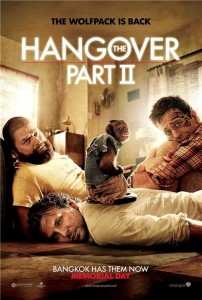 We’ve had Diary of a Wimpy Kid 2, we’ve just endured Scream 4, we got a bit excited for Fast Five, we’re eagerly awaiting Hangover 2 and we’re going pretty ‘potty’ for Harry’s 8th installment. It’s shaping up to be quite the year of the sequel, but where do we draw the line between sequel and sellout?
We’ve had Diary of a Wimpy Kid 2, we’ve just endured Scream 4, we got a bit excited for Fast Five, we’re eagerly awaiting Hangover 2 and we’re going pretty ‘potty’ for Harry’s 8th installment. It’s shaping up to be quite the year of the sequel, but where do we draw the line between sequel and sellout?
With an estimated 27 sequels being released this year, and a further 95 in the making, are we willingly returning to see our favourite roles reprised or are we simply putting up with Hollywood’s repetitive nature?
Every subsequent Fast And Furious film received a lower critical reception than the one before but this didn’t stop Hollywood churning out the fifth instalment. While this one proved to be a dominating box office smash, producer Neal H. Moritz has already announced that a sixth and final film is set for production.
It’s undeniable that money will be made from an already established ‘brand’ like Fast and Furious, which over the years has secured a large loyal audience. As a long-held tradition of Tinseltown’s filmmaking process, sequels work because they largely eliminate the fear of having a box-office bomb.
 The franchise exists to secure viewers by arousing interest; audiences will turn up to see how the characters develop and how the narrative progresses in a movie which they’re already invested in. Regardless if they leave the cinema slating it against its previous instalment, they’ve still paid that money and generated those ratings- which could be argued as the ultimate intention in cinema.
The franchise exists to secure viewers by arousing interest; audiences will turn up to see how the characters develop and how the narrative progresses in a movie which they’re already invested in. Regardless if they leave the cinema slating it against its previous instalment, they’ve still paid that money and generated those ratings- which could be argued as the ultimate intention in cinema.
This is where the criticisms pour in. Some might blame Hollywood for substituting originality for profit. We’ve all seen the sequels where the characters have burnt out and the storyline is unrecognisable and it seems as if film after film is churned out based on an indistinct idea that initially received some box-office glory.
But in a year that’s set to bring scores of sequels, spin-offs and re-boots, we’ll have to judge whether Hollywood truly has run out of ideas, or rather that the profit-driven face of cinema proves that the franchise bargain pays off.



